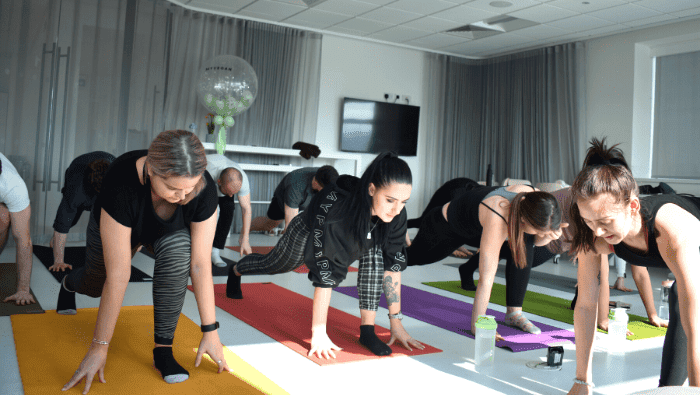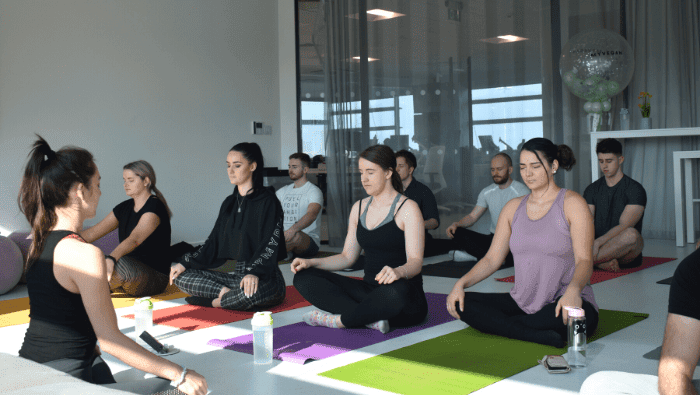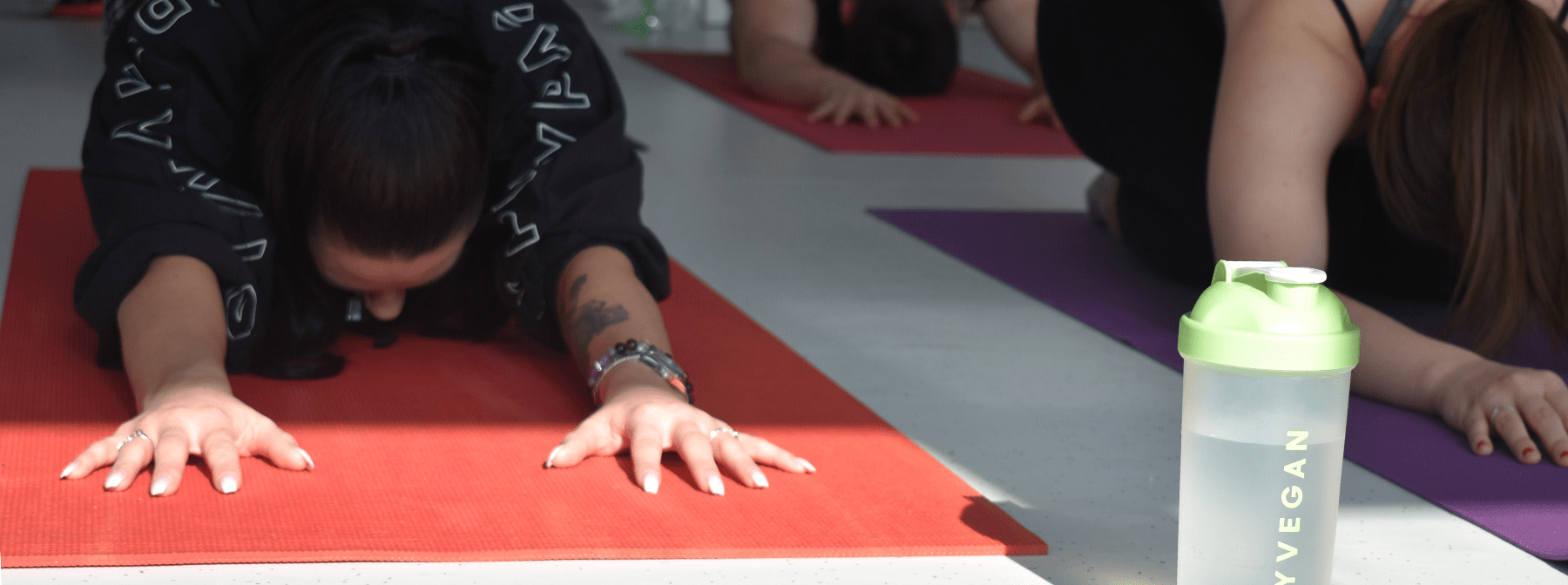
Living holistically has become more important for many people over the last few years. Having habits that are mindful, and support both our physical and mental wellbeing are starting to grow in popularity.
Yoga is the perfect blend - not only does it have physical and mental health benefits, but it also helps us to connect the mind and body to allow it to function as one unit.
Read on to learn about these 5 benefits of morning yoga:
- Better mental health
- Improved digestion
- Flexibility and strength
- Support a healthy heart
- Increased work, productivity and learning

5 Benefits Of Morning Yoga
Better Mental Health
Yoga has been shown to help with the symptoms of common mental health issues, such as low mood and stress. Whilst practicing yoga may not be curative, its benefits include soothing the ‘fight or flight’ reaction associated with stress and worry, whilst stimulating the ‘rest and digest’ part of the nervous system.
It is thought the combination of breath-work and physical movement is the key to the mental wellbeing aspects of yoga; Hatha yoga, a slower, breath-focused form of yoga, has been shown to have particular benefits on mental health.

Improved Digestion
The exact mechanisms behind the effect of yoga on gut health are not completely understood. However, yoga can be used to help manage symptoms of functional gut disorders such as IBS, as well as common digestive discomforts such as constipation.
It is likely that the beneficial effects of yoga are due to the combination of certain postures are movements aimed at the gut, alongside the calming aspects of meditation and breathing. Poses that involve twisting of the abdomen and core may be especially beneficial for gut health.

Flexibility and Strength
The great thing about yoga, is anyone can do it! Yoga does not discriminate based on age, fitness levels or gender. Regular yoga practice can help to build a strong core, which is important during all stages of life, and may help to counteract the back and neck pain associated with working at a desk.
If you do other forms of exercise, yoga be helpful for preventing injury. Furthermore, being both strong and flexible can help to prevent the physical effects of ageing.
Support A Healthy Heart
Regular exercise is an important part of heart health – exercise increases blood flow and works our heart and lungs (in a good way). Fast-paced forms of yoga, such as Ashtanga or Vinyasa yoga, are more likely to have a direct impact on heart health, in a manner similar to traditional cardiovascular exercises.
However, it is important to note that all forms of yoga that include breathwork and meditation can have a positive effect on heart health, due to the stress-lowering properties of yoga. A reduction in stress levels can help to improve blood pressure, which can have multiple benefits, not only on heart health!
Increased Work, Productivity and Learning
Interesting research investigating the impact of yoga on the brain has found that practicing yoga increases the function of the pre-frontal cortex; this area of the brain is responsible for planning, decision making and short-term memory.
Yoga also has a positive impact on the hippocampus – an area of the brain involved in learning and memory consolidation. These effects were seen in relation to hours per week of yoga, rather than overall number of years spent practicing yoga, so it’s not too late to start supporting your brain health!
Take Home Message
In summary, yoga has a whole host of benefits, both physical and mental. The unique combination of physical movement, combined with breathwork and meditation has been shown to have a positive impact on various conditions and overall wellbeing. Whether you prefer slow or fast-paced movement, it’s worth experimenting to find the style of yoga that suits you best.
This article is not a substitute for medical advice; if you have concerns regarding your health, please contact your GP or other relevant healthcare professional.
FAQs
Is it good to do yoga in the morning?
Yoga helps to improve blood flow within the body, which can be helpful with feelings of awakeness and alertness in the morning. The calming effects of yoga may also be useful to help you to tackle stressful events that may find their way into your day.
What time is best for yoga in the morning?
This will be different for everyone – social media can make us think that we need to be practicing yoga at sunrise at the side of a mountain. For most people this isn’t achievable; ideally, find the time for yoga before the chaos of the day fully starts, but it definitely doesn’t need to be at sunrise!
How long should morning yoga last?
Again, this depends on individual factors, but even 20-30 minutes, 3 times a week, can provide some of the benefits of yoga.
Is it better to do yoga before or after breakfast?
Going upside-down, or twisting the core after eating can cause nausea or abdominal pain in some people; if this is the case, try fitting in your morning practice before breakfast. Alternatively, a light, easily digestible breakfast such as a banana or small bowl of cereal may provide you with enough fuel to power you through a yoga practice without causing issues.
Should I drink water before morning yoga?
It’s important to drink water before any exercise, and yoga is no exception! Make sure to have some water following your yoga practice as well, to help prevent dehydration.
Should I eat before doing yoga in the morning?
As above, there are some yoga moves that may cause pain or nausea if you do them soon after eating. However, you will also need something to fuel your yoga session, especially if doing a high-intensity type of yoga.

5 Full-Body Exercises for a Beginner Workout at Home
No gym? No problem. This home workout plan is suitable for all fitness levels and can be done with or without weights.

How Easy is it to Go Vegan? | Leah Grace's Story
"It really is a lot easier than you think!"
- Gothe N, Khan I, Hayes J, Erienbach E, Damoiseaux J. Yoga effects on brain health: a systematic review of the current literature. Brain Plast.2019; 5(1): 105-122.
- Silva T, Ravindran L, Ravindran A. Yoga in the treatment of mood and anxiety disorders: a review. Asian J Psych. 2009; 2(1): 6-16.
- Cramer H, Lauce R, Langhorst J, Dubos G. Yoga for depression: a systematic review and meta-analysis. Depress Anxiety. 2013; 30(11): 1068-1083.
- Hofmann S, Andreoli G, Carpenter J, Curtiss J. Effect of Hatha yoga on anxiety: a meta-analaysis. J Evid Based Med. 2016; 9(3); 116-124.
- Schumann D, Langhorst J, Cramer D. Randomised clinical trial: yoga vs a low-FODMAP diet in patients with irritable bowel syndrome.
- Jayasinghe S. Yoga in cardiac health (a review). Eur J. Cardiol Prev Rehab. 2004; 11(5): 369-375

Related Articles








